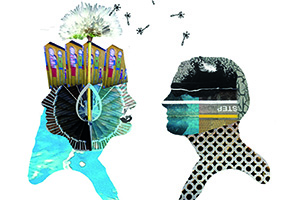Empathy and resilience in medical students
Over an eight-week pilot programme, medical students were taught the fundamental principles of good visual composition and abstract photography. At the end of the programme, they were invited to produce an artwork to represent their personal response to a patient consultation.
It is essential that medical students complement their outstanding academic skills with the ability to demonstrate empathy and develop resilience. The ability to reflect on their clinical experiences can be the key to becoming a more empathic doctor, able to withstand the emotional and physical stress of clinical practice. This pilot programme sought to explore how creating visual art could help students to build resilience and develop greater empathy.
 The project supported students in analysing their feelings during patient consultations and encouraged them to consider what they could learn from those experiences. The project emphasised the importance of achieving a balance between becoming too involved and switching off emotionally, and also helped students develop strategies to avoid burnout. The programme explored setting appropriate boundaries, finding time for reflection, and achieving a healthy life-work balance.
The project supported students in analysing their feelings during patient consultations and encouraged them to consider what they could learn from those experiences. The project emphasised the importance of achieving a balance between becoming too involved and switching off emotionally, and also helped students develop strategies to avoid burnout. The programme explored setting appropriate boundaries, finding time for reflection, and achieving a healthy life-work balance.
Students were asked to explore how they themselves felt and how they thought their patients felt during a consultation.
To develop awareness of their own emotions, they were also asked to take photographs that reflected their mood each week. The students spent time discussing the emotional impact of their photos and reflecting on the patient interaction that was to form the basis of their creative work. Their final artworks comprised of a photomontage, with layers of images reflecting the contrasting and diverse emotions they had experienced through their clinical practice, and a narrative about the patient interaction their artwork depicted.
Conclusions
| Students noted that the visual and creative element of the sessions helped them to represent their thoughts and allow more ‘raw’ forms of feeling to emerge. |
| The small group size allowed students a safe space to reflect honestly on how they felt when involved in a patient encounter which they hadn’t deemed significant. |
| Upon reflection, students said that they believed it was good for their mental health, and appreciated that the programme offered a much more flexible and supportive space to work together rather than in competition. |
| The project team concluded that a programme of this nature could fill a vital gap in the curriculum with respect to building resilient and empathic doctors. |
Student feedback
I think it’s made me cringe more...it made me notice when people say ‘go and look at bed six, they’ve got a really good hernia.
We don’t [usually] get to chat about how things make us feel, we just have to get on with it.
Project team
Co-designed and delivered by Critical Care Consultant and Honorary Senior Lecturer at King’s Dr Stephanie Strachan, undergraduate medical student Katharine Stambollouian and artist Emma Barnard.